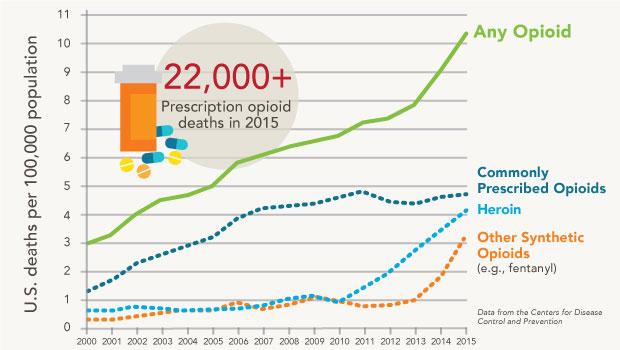The opioid crisis: How our research is seeking solutions

Original image via Musicentropy/Wikipedia.
Tom Petty’s accidental death from opioids shows we need to find safer alternatives for chronic pain. See how KPWHRI research helps to do just that.
News came last week that rock star Tom Petty’s death in October was caused by an accidental overdose of opioid medication he was taking for chronic pain. Along with the tragic loss of others famous and not-so-famous, Petty’s death reminds us why health officials have declared the current opioid epidemic a national emergency: Some 91 Americans die every day from opioid-related overdose, according to the Centers for Disease Control and Prevention.
"Opioid misuse, abuse, and addiction are among the most significant public health concerns that we face today," says Kaiser Permanente Washington Health Research Institute (KPWHRI) Senior Investigator Denise Boudreau, PhD. Research shows that prescription opioids can lead to heroin use. As the country deals with an opioid epidemic and patients look for safe ways to manage pain, much of the foundational evidence about opioid use and leading innovative solutions to these issues come from KPWHRI.
"KPWHRI has a long history of studying how to manage patients' chronic pain in primary care," says Michael Parchman, MD, MPH, KPWHRI senior investigator and director of the MacColl Center for Health Care Innovation. "We want to offer evidence-based, effective care options for patients with pain."

Opioid-related work at KPWHRI today
Our current research on making chronic pain care safer and more effective includes:
- Studying primary care interventions for chronic pain.
Senior Investigator Lynn DeBar, PhD, MPH, arrived at KPWHRI this summer as the leader of the pragmatic randomized clinical trial Pain Program for Active Coping & Training (PPACT). Supported by the Health Care Systems Collaboratory of the National Institutes of Health and involving patients and providers in three Kaiser Permanente regions (Georgia, Hawaii, and Northwest), PPACT compares usual primary care for chronic pain, including prescription opioids, to a multipronged intervention. The PPACT intervention coordinates and integrates services that help patients with chronic pain adopt self-management skills and limit prescription opioid use. Dr. DeBar's team is measuring patient-reported pain and function and calculating health care system costs for patient medications and services over the study.
- Evaluating the impact of a state strategy to reduce prescription opioid use.
Dr. DeBar also leads Back on Track, a study funded by $5.7 million from the Patient-Centered Outcomes Research Institute (PCORI) to determine how Oregon's changes to Medicaid reimbursement are affecting patients with low back pain. The Medicaid changes promote use of nondrug treatments such as physical therapy, cognitive behavioral therapy and alternative approaches such as yoga and massage, instead of prescribing opioids for low back pain. Data sources for the evaluation by Dr. DeBar's team will include electronic health records and surveys and interviews with staff and Medicaid-insured patients at federally qualified health centers in Oregon and California.
- A nationwide pragmatic trial on increasing access to effective treatment for opioid use disorders in primary care.
Senior Investigator Kathy Bradley, MD, MPH, leads the PRimary Care Opioid Use Disorders (PROUD) treatment trial funded by the National Institute on Drug Abuse Clinical Trials Network. Based on successful pilot work, PROUD is a pragmatic trial of collaborative care for opioid use disorders.
- Addressing opioid prescribing for chronic pain patients in rural clinics.
Led by Dr. Parchman, researchers are helping clinics apply a team-based approach, grounded in primary care best practices, to reduce inappropriate prescribing of opioids for chronic pain. Funding is from the Agency for Healthcare Research and Quality.
- Measuring misuse, abuse, and addiction among long-term users of opioids and evaluating risk factors.
Dr. Boudreau co-leads a $10 million study to determine the extent of harms from opioids for chronic noncancer pain. The national project studies how factors such as age, race/ethnicity, mental health conditions, and other substance use disorders influence risk for opioid-related harms.
- Evaluating the risk of birth defects from opioid use during pregnancy.
Dr. Boudreau also leads a U.S. Food and Drug Administration-funded study to measure the association between use of opioids during early pregnancy and risk of neural tube defects.
- Developing methods for studying overdoses and deaths from extended-release/long-acting opioids.
KPWHRI scientists including Assistant Investigator David Carrell, PhD, are working on using data from insurance claims, electronic health records, state death records, and other sources to measure opioid harms and find factors that affect them. Jennifer Nelson, PhD, senior investigator and director of biostatistics, and Susan Shortreed, PhD, associate investigator, lead a coordinating center in charge of obtaining, managing, and analyzing data for a national consortium on extended-release/long-acting opioids.
- Understanding opioid use for pain in adolescent and young adult (AYA) cancer patients in their last weeks of life.
Associate Investigator Karen Wernli, PhD, has funding from the KPWHRI Development Fund to explore using insurance claims data to study opioid use in AYA patients with late-stage cancer.

A foundation of patient-centered pain management
"Patients with chronic pain need help finding safe and effective treatments so they can resume valued life activities and have a high quality of life," says Senior Investigator Michael Von Korff, ScD. "That's what we heard from our patient advisors in our study on reducing risks of long-term opioid use." Dr. Von Korff is just completing his PCORI-funded project on efforts by Kaiser Permanente Washington to increase patient safety around opioids for noncancer pain.
Much of the KPWHRI research on opioid use is grounded in Dr. Von Korff's seminal work on chronic pain and how it interferes with everyday quality of life. Beginning in the 1990s, he led studies on low back pain and other common chronic pain conditions. From this work, early in the 2000s, he began exploring how to reduce unsafe, ineffective opioid use, long before the current national attention on the epidemic of opioid harms.
"For years, KPWHRI has supported sensible local and national policies and guidelines about opioid prescribing," Dr. Von Korff says. "We've also emphasized ongoing conversations between patients and their health care teams about managing chronic pain. I'm encouraged that this issue is finally getting the attention it deserves."
For more information, see our KPWHRI opioid research page.
opioid research

Stopping the opioid epidemic: Priority research at KPWHRI
Opioid misuse and overdose are now a national priority. For decades, KPWHRI has worked to help patients find safe, effective ways to manage chronic pain.
Learn more about our work in opioid research.


